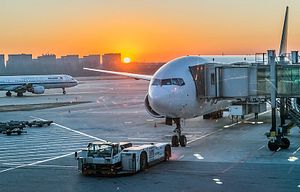On November 5, China opened its first six-day International Import Expo (CIIE) in Shanghai. In his keynote speech delivered at the opening ceremony, Chinese President Xi Jinping repeatedly mentioned China’s commitment to reform and opening-up over the past 40 years, vowiing to “push for a new round of high-level opening-up.”
On the same day, the Fairbank Center at Harvard University — one of the most prominent academic institutes for Chinese Studies in the world — also initiated a week of public events marking 40 years of China’s opening and reform.
However, a group of Chinese intellectuals who had been scheduled to attend the Harvard events were barred from leaving China.
According to a statement issued on its website, the Fairbank Center had planned to host a visiting delegation of leading scholars from the Unirule Institute of Economics — China’s top independent think tank, based in Beijing — to attend a series of roundtable discussions this week.
“We are disappointed to hear that the delegation leader, Sheng Hong, and other delegation members were prevented from leaving China,” the Fairbank Center said. “Conversations like these are an important form of exchange between the United States and China, which is vital in a time of growing tension between our two countries.”
Sheng, the executive director of Unirule, told the South China Morning Post that he was stopped at Beijing Capital International Airport from leaving on his flight to Boston in the morning on November 1.
“They told me I would endanger national security and was not allowed to leave the country,” Shen said. “I was completely shocked. How can my attendance at an academic conference affect national security? This is absolutely absurd.”
Through his Twitter account, Sheng expressed his disappointment in an emotional way:
I remember that I went to the University of Chicago in 2008 to participate in the seminar marking China’s 30 years of reform and opening up initiated by Coase [Ronald Coase, the late economist and Nobel laureate]. I felt [back then] that the reform had already been accomplished…[Now], it seems like a lifetime ago.
The SCMP reported that Sheng’s colleague, Jiang Hao, acting deputy director of Unirule, was also barred from leaving China without being given any explanation from China’s border control officers. Jiang believes that “Unirule is obviously being targeted here.”
Jiang’s belief is based on more than the travel restriction.
In recent years, China has been fiercely cracking down on independent think tanks. Unirule is so far the last remaining liberal think tank in China.
Despite extreme pressure, Unirule still has been advocating for free markets, reform and opening up, and other liberal ideals by publishing independent articles and researches on its website. The most phenomenal article published by Unirule in recent months is a long essay, titled “Our Dread Now, and Our Hopes,” written by Xu Zhangrun, a law professor at Tsinghua University. In his essay, Xu called for restoration of the two-term limit for the Chinese presidency and rehabilitation of the history of the Tiananmen Incident — the two most sensitive political topics in today’s China. Apparently, both Xu himself and Unirule took a big risk.
In early August — days after Xu’s essay was published — Unirule was evicted from its Beijing office.
The Chinese government’s decision to bar Unirule’s intellectuals from attending the Harvard event on the ground of “national security” will only further deepen the international community’s suspicion toward China’s promise on reform and opening-up.
Notably, a large group of local Chinese analysts now are actively arguing that the ongoing CIIE is “a sign of China’s commitment to reform and opening up” because China is “buying more from the world.”
If Chinese analysts, along with Chinese top authorities, truly believe that China’s current “buying from the world” equals to “reform and opening up,” then they must have gotten the fundamental idea of this 40-year long policy wrong. And the misconception of this national policy will unfortunately lead China to a worrying future.

































